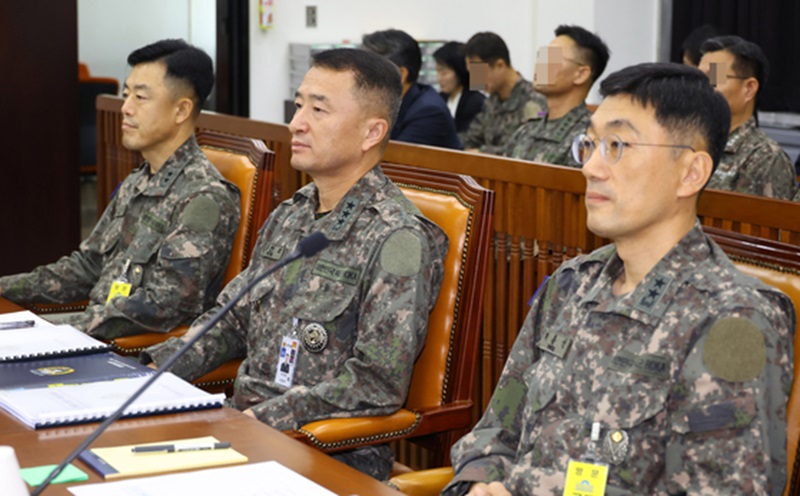Over 3,000 North Korean soldiers have arrived near the front lines of Russia’s war against Ukraine, South Korea’s presidential office said Wednesday, as Pyongyang’s foreign minister arrived in Moscow for talks whose details have been kept closely under the wraps.
A presidential official who spoke to reporters on condition of anonymity said that the North Korean soldiers “are wearing Russian military uniforms and using Russian weapons systems” as part of a “disguised deployment.”
The official also said the soldiers “face multiple obstacles, such as the language barrier,” and that Seoul is “continuously watching to understand when they will actually enter combat” alongside Russian forces that have invaded Ukraine.
The official’s remarks came a day after Western officials told foreign media that small numbers of North Korean soldiers are already inside Ukraine, with more expected to arrive in the coming days.

Their apparent presence in Ukrainian territory exceeds recent confirmations by South Korean, U.S. and NATO officials that some 10,000 North Korean soldiers are in the Russian Far East for training while others are being transferred to the Kursk region in western Russia, where Kyiv has mounted a counteroffensive.
“It seems that a good many of them are already in action,” an unnamed Western intelligence official told CNN on Tuesday.
South Korea’s National Intelligence Service (NIS) currently estimates that up to 11,000 North Korean troops could be dispatched to Russia for training to join the fight in Ukraine by December.
Officials from Seoul’s Defense Intelligence Agency (DIA) separately told lawmakers on Wednesday that there was a “possibility” that “an advance party consisting of troops from the North’s 11th Army Corps is engaged at the front lines.”
However, the agency said it had no evidence that North Korean soldiers have already been killed in battle, despite earlier comments by Jonas Ohman, head of the Lithuania-based nongovernmental organization (NGO) Blue/Yellow that has been providing assistance, including drones, to Ukrainian troops since 2014.
Ohman said in an interview with Lithuanian outlet LRT on Monday that “the first visual contact between the Ukrainian unit that we are supporting and the North Koreans took place on Oct. 25 in Kursk” and that “all but one of the Koreans were killed.”
The NGO chief noted that the sole survivor had papers identifying him as a member of the Buryat ethnic minority based in the Russian Far East, but whether this is actually true remains to be seen.
Ukrainian media reported earlier this month that North Korean troops training in Russia were being issued military identity cards identifying them as Buryats, who closely resemble Mongolians and share similar customs.
In his briefings to the Intelligence Committee last week, NIS Director Cho Tae-yong said the North is implementing strict control measures, including collective relocation and isolation of deployed soldiers’ families, to limit general awareness of the regime’s decision to send troops to Russia.
The NIS believes Moscow is paying each North Korean soldier $2,000 per month — a vast sum in a country where the average official wage was under $3 per month in 2022 — though most of that money is likely to be confiscated by Pyongyang.
The DIA also told lawmakers that its expects “high casualties” among North Korean troops because “much of the war revolves around drones, which they are not being supplied with.”
Despite the regime’s efforts, news of the deployment is gradually spreading within North Korea, according to the NIS, which said it had received reports of “selected soldiers’ families being visibly distressed.”
These claims were repeated on Wednesday by the presidential official, who told reporters that the North Korean military has forbidden the use of mobile phones by its officers and told the families of deployed soldiers that they are away for training.
The official also disclosed that Russian Defense Minister Sergei Shoigu visited Pyongyang on Oct. 23 and 24, days after South Korean intelligence announced that North Korean troops were readying for deployment inside Russia, and that North Korean Foreign Minister Choe Son-hui was likely in Moscow for talks to “discuss how the two countries should respond” to Western and South Korean reactions.
The DIA further told lawmakers that the North will “try to bring the nuclear issue to the forefront before the U.S. presidential election,” citing intelligence that the regime has completed preparations at its Punggye-ri nuclear test site.
The North could make use of the third tunnel shaft at the site to conduct its seventh nuclear weapons test, according to the agency, which said the timing would depend on the “international strategic environment.”
The DIA also told lawmakers that Pyongyang appears to be “almost finished readying the launch of an intercontinental ballistic missile equipped with a re-entry vehicle and moved a transporter erector launcher into position.”
BY MICHAEL LEE [lee.junhyuk@joongang.co.kr]




